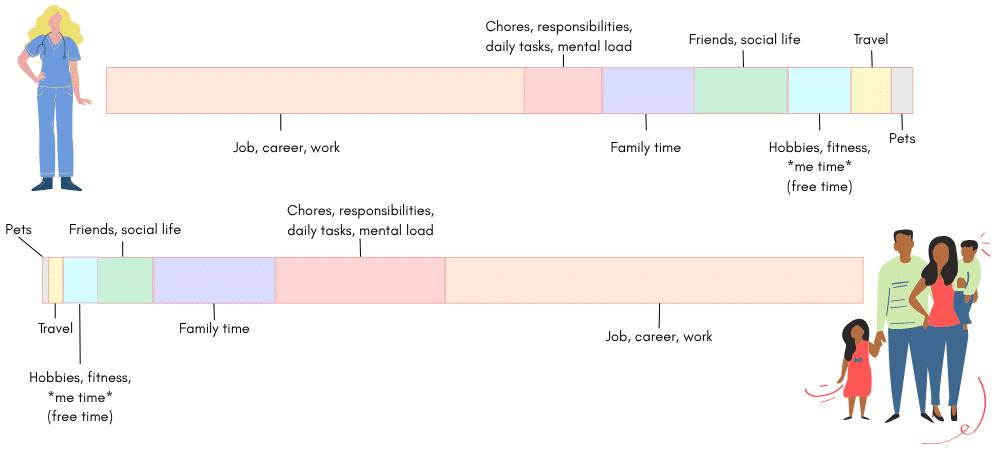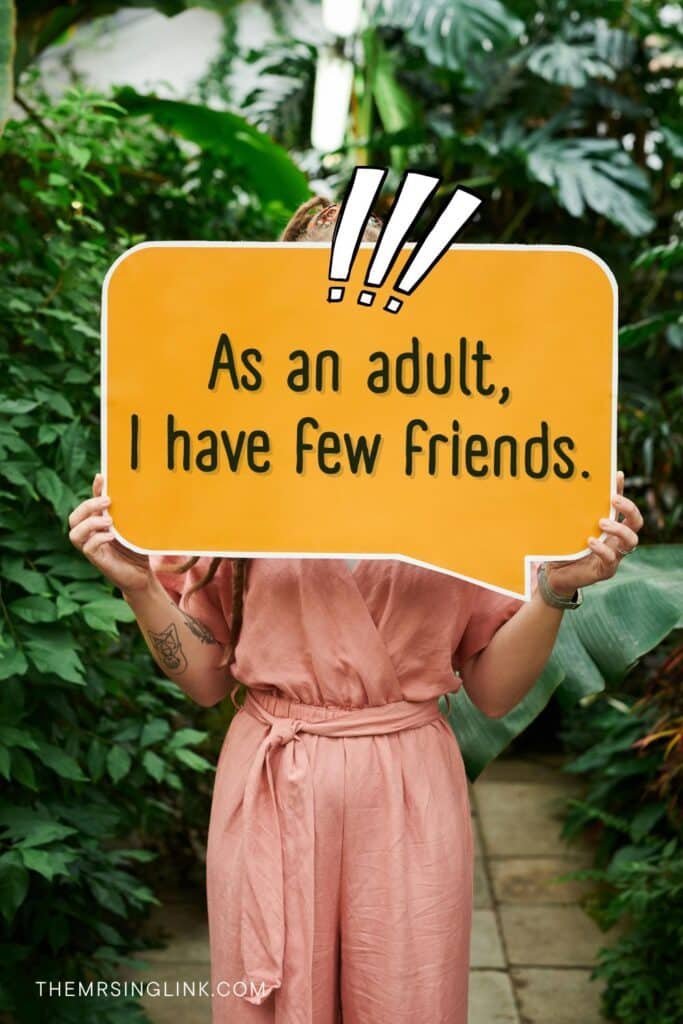Are married women the common denominator for friendship affliction, and are single friends constantly at a disadvantage?
I want to start off by saying – as a married woman (though with no children) – I can actually understand the argument being made by single friends. The issue being that many single women are feeling exiled by their married friends.
Is there a level of truth to this? I can believe so!
On the other hand, what needs to be taken more into account is that friendships after marriage are likely to experience some level of a natural shift. This means, *deep inhale*, I can also understand the argument, or counterargument being made by married friends (and those with children).
I’m primarily speaking in response to the video on this article I stumbled upon (I encourage you to listen), where a woman has seemingly gone viral on social media for expressing that married women are more self-centered. In turn their single friends are often neglected (or wiped off the totem pole entirely).
Again, as a married woman (without children), I aim to share my *hopefully* fair and honest perspective from both sides, and to emphasize that friendships between single and married women are not a one-sided issue.
The clash between single friends and married women

Are married women *actually* more self-centered?
Referring back to the video in that article, the woman openly expresses her belief in that married women become very self-centered. For me, personally, her statement is rather generalized – enough for me to counter with that married women are, in fact, the opposite of self-centered.
Let me rephrase that. Marriage is [to be] the embodiment of selflessness, making it the opposite of self-focused. To say that married women are more self-centered is a flawed argument when married women lawfully commit to considering the needs, feelings and best interest of another person.
If the claim is that married women are self-centered according to friendship standards, then we can also state the same claim for single friends.
It’s rather self-centered of single friends to expect their married friends to measure up in the manner of friendship that of prior to marriage. It’s also self-centered to feel entitled to a person – who they are prior to life events and circumstances – to fit an individual, self-serving mold.
Friendship not revolving around single friends doesn’t somehow make married women self-centered. It’s entirely baseless to claim that only married friends are self-centered in friendship.
Are dynamic differences in friendship the breaking point?
Are single and married friends simply butting heads due to drastic differences in life dynamics?
Here’s a fact that remains unchanged: married women with kids have additional priorities and responsibilities to consider, therefore they allocate more time to their spouse and children.
This is what a difference in those dynamics would look like on a scale depicting a single woman and a married woman with kids. *And, no, there’s not a Right or Wrong here.

For reference, and to make the depiction fair, both women are working women (so the ‘job, career, work’ sections are the same in size for both), and I also arranged the meter similarly by importance, significance, and respective allocated time. *I also realize this depiction is highly subjective.
The differences in dynamics based on each woman’s “life meter”, let’s call it, is that the married woman with kids does have a larger ‘chores, responsibilities, daily tasks and mental load’ compared to the single woman (even if she has an equal partner sharing that load).
We’re not factoring in things like grocery shopping and cooking for four (instead of one or two), soccer practice, parent/teacher conferences, school festivities, play dates, doctor’s appointments, extra loads of laundry, packing lunches, sickness, and cleaning the house more often, which are all anticipated logistics of partnership and parenthood, not exactly quality “family time”.
Single friends, let’s be realistic. It’s okay to admit that you have more time to allocate, but it is not reasonable to expect married women (especially with kids) to allocate the same amount of time, energy and effort (to friendship) as you can.
Unfortunately, the breaking point for many single and married women in friendship is when expectations become unreasonable and unrealistic (i.e., too low or too high).
It would seem that single friends take this breaking point more personally, no offense, whereas married women likely won’t concern themselves when they have other significant priorities to care for (i.e., their marriage, spouse and children).
Effort won’t always be the same, or a constant
The woman in the video made sure to announce how she felt about married women reciprocating so little (if at all) compared to single friends in terms of time, energy and effort. What the woman failed to elaborate, though touched on as being some of a single woman’s important life events, were her examples of travel and moving.
Does this woman think that frequent travel, or moving across the country (for a job, or personal desire) won’t somehow change what effort looks like in friendship?

Changes in effort can also change the value of effort. In one breath, is she willing to admit that if she moves away from a friend that a simple weekly phone call or text is valuable effort? Then what about the married friend with kids making a similar effort within her capacity or circumstances – is that somehow or no longer enough or valuable?
The woman in the video makes it out to seem like friendship with married women are a lost cause when effort simply won’t match their ideal level. That anything less or different is negligence since she is still able to keep up with a status quo as the single friend.
Again, effort for married women with kids may look a hell of a lot different from that of a single woman without kids.
The fact is, whether for single friends or married friends, time and effort allocated, what that looks like and how often, is not always going to be a constant. Rather, it fluctuates with life’s normal ebbs and flows.
Are single friends simply more at a disadvantage?
If you were to watch the viral video of the woman claiming the severe imbalance of effort and investment between single friends and married friends, I think that is loudly being implied. That, according to her,
“Single friends must be more forgiving, understanding, ever-accessible and ever-available (of married women).”
From proposals, engagements, bachelorette parties, weddings, and pregnancies, single friends are to support married women in all these life events and circumstances. She also goes on to say that,
“Rarely, if ever, do married women really allocate the time and investment into their single friends life events.”
Including things like work promotions, travel, moving homes or career moves, she makes sure to exemplify these life achievements as having nothing to do with a man. She even goes as far as to label single friends being treated like “Quasi Boyfriends” by married women.
Here’s the thing, I can understand a single woman’s frustrations of her married friends not being as interested, celebratory or passionate about their life events. I also understand how single friends can be treated like temporary buffers of emotional support for married women – i.e., they only seem to call, text or get together when they’re in need.
In and of itself, I get that it feels like single friends are only wanted when it’s totally convenient for married women.
A single friend’s life events and circumstances are no less important than a married woman’s, and I do agree that married friends should be more receiving and thoughtful of the things that are important to their single friends without treating them like a part-time therapist or confidant.
While the norm isn’t necessarily to throw an elaborate, themed party for a work promotion like it is to have a wedding or throw a baby shower, we’re also comparing two very different things. One is a career title or salary upgrade, and the other is commitment and life.
Unfortunately, I think this is more of an accepted yet silent disadvantage because people either love Love and are enamored by the bringing of life into the world, or it’s been conditionally expected to elevate those things.
All in all, I can agree with the notion that single friends are at a disadvantage in terms of friendship with married women. Single friends desire genuine recognition for their personal achievements and interest in their life dynamic apart from marriage and babies. I get it, I truly do.

Are both sides lacking understanding and compassion?
We forget that true friendship is a privilege – it’s not a guarantee, and they’re not always easy or effortless (to our absolute liking). Yet I think we like to define friendship as having no influence or impact from other life differences and personal values…when it just doesn’t work like that.
Yes, friends are people outside their “identities”, but those very things are what shape a person and their life experience. The woman in that video hints that married friends with kids make motherhood and marriage their identity.
The truth is, everyone makes something their identity (including single friends) whether that be their anti-marriage and over-population (anti-procreation) beliefs, career, social life, education, hobbies, political stance, religion/spirituality, personal aesthetic, diet and lifestyle choices.
A married woman likely values things differently from that of a single woman, and there’s no reason to discourage that by saying single women and married women can’t be friends. We can’t go on expecting married women to operate like they’re single and for single women to operate like they’re married.
We’re just grossly lacking acceptance and understanding of each other.
Like I’ve stated in the first sentence of this post, I fully understand where single women are coming from in terms of feeling like their married friends drastically minimize all effort or drop off the face of the earth completely after marriage (and having kids).
Even I have had married friends with kids wind up doing the same. If it weren’t for me reaching out, I’d never hear from that friend again.
I can also attest to being a married woman and feeling like I must give beyond my capacity (in time, energy and effort), and that what I am able to extend is often viewed and treated as insufficient. So I can imagine married women with kids may feel similar, where they are expected to exceed their bandwidth (in time, energy and effort) in order to accommodate their single friends, which is often viewed as, at best, the bare minimum.
Alas, as a married woman, I’ve experienced smoother, guilt-free friendships particularly with other married women simply from there being a shared commonality of genuine understanding and acceptance.
That, hey, my husband comes first, and because I actually enjoy spending time with him, I prefer allocating more of my time to him. More often than not, most wives completely back and respect that.
But, still, all friendships desire reassurance – that the friendship matters and bears a measure of weight (significance) in a person’s life. Both single friends and married friends (with kids) desire to be checked on, inquired about personal happiness, important events and life circumstances as well as direct initiative.
Whether this means inviting your married friend to something last minute you know they’re likely to decline, they will still appreciate the invite or making attempts with your single friends to get together in advanced. They will appreciate being penciled into your schedule even if far and few.
Aside from that woman making it seem like married women are the sole problem and that single friends seem to default to doing most of the leg work in friendship, it’s more about coming together and hopefully finding a middle ground that works for two people with different lives and differing capacities of time, energy and effort.
There won’t be a perfect, easy solution, and given her emotional response, she’s expecting there to be.

Men don’t seem to (openly) have this problem
It’s not to say that male single friends never clash with male married friends (and vice versa), but I just don’t believe this to be a chronic or problematic issue between men.
Even in my research, despite the one-off circumstances where single friends can be a “bad influence” for married men, male friendships seem to operate totally different from that of female friendships in general.
If I were to ask why that could be, I can come up with a few hypotheses:
- Men are less likely to emotionalize or over-emotionalize friendship in general. This is not to say that women are over-emotional or that women having emotions is wrong.
- Men are more willing to and capable of overlooking effort imbalances and differences while also avoid grading or offing friendships based on those discrepancies.
- Men have simply accepted that single friends are different from married friends – they understand and accept the constraints of those differences and are able to value the level of friendship that either can produce without expecting more.
- Men are capable of having friendships at different levels, including with those that were once close. For example, men will still consider someone a friend despite going their separate ways in life (i.e., after high school or college) while managing to reach out/check in a few times a year and that level of effort be enough.
My husband, as a wonderfully prime example, has “friends” he only speaks to once every six months, whom he gets together with yearly, friends who take days if not sometimes weeks to respond (they play phone tag often) and he even has friends he only seems to connect with on social media.
As a married man (with no kids) who is good friends with mostly other married men (with kids), who were all once single, he can even admit that those friendships have changed since marriage and kids. They see each other significantly less yet seem to make as much of an effort to remain “in touch”, with both friends close in proximity and those who live far away.
Regardless, he still calls and values these individuals as friends – despite the changes, differences, and even imbalances. I can easily point out imbalances within his friendships, yet he doesn’t seem to care to allow those things to have an effect. Instead, he always seems to side with grace and mercy or otherwise lets dwindling friendship come to its demise naturally.
Women seem to have a much more difficult time valuing different levels of friendship without completely writing them off or labeling them as bad friends. Myself included.

Is there a solution, or are single and married friends too incompatible?
After watching the video multiple times – yes, I know, but I have to in order to empathize with what the woman is saying – I’ve come to multiple of my own conclusions.
As in the heading of this point, there’s some truth in that single and married friends are somewhat incompatible simply because of the contrast in life circumstances and dynamics. Yet I still don’t think it’s impossible for single and married women to be friends.
IMO, married women need to be able and willing to come down from their pedestal while single women need to be more accepting of a married woman’s other commitments, constraints and shorter bandwidth.
Also, I fully grasp the old concept of it taking a village to raise children. This simply means that women are encouraged to being one another’s support system, especially for those with children.
Granted, motherhood and marriage are not everyone’s aspirations or cup of tea, which brings me to expand on that point. Married women are fully encouraged to finding that support system, and that primarily being with other married women with children.
Additionally, the same applies to single women. Single friends are encouraged to finding that support system (or tribe) with other single women. This isn’t meant to divide single and married women but to alleviate some of the weight of expectations from both sides, so that friendships between single and married women can be respected and enjoyed for what they are and offer.
Is this a perfect solution? No, and there is no perfect solution. The ideal is for both sides to understand where they fall short without demonizing one another and be able to meet one another where they’re at (with grace) in hopes of finding common ground.
